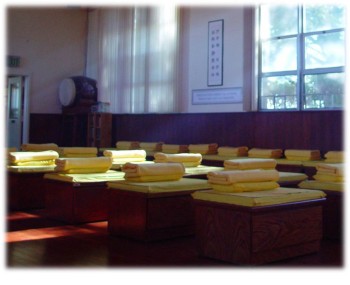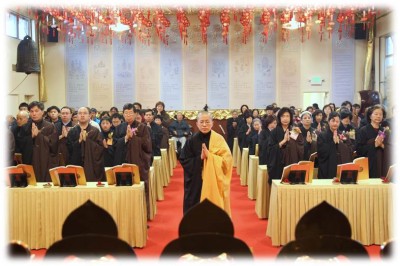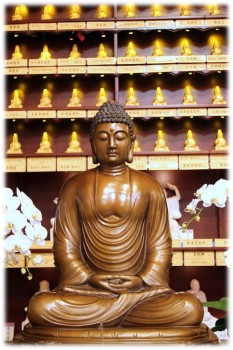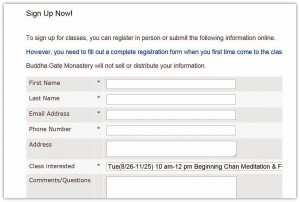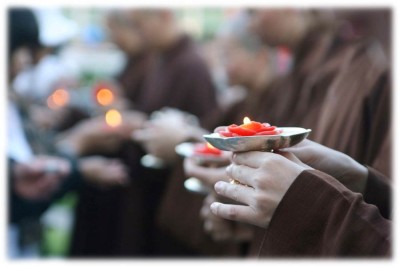[:en]
I. Enter the Heart of Chan practice
What is Chan?
Some people ask, “What is Chan?” The Buddhist sutra clearly states, “Chan is the mind of the Buddha; the scriptures are the mouth of the Buddha; the precepts are the body of the Buddha.” Chan is the Buddha’s mind. All of the Buddhist sutras and scriptures, i.e., the Twelve Canons in the Tripitaka, or the recorded words of the Buddha, as well as all of his actions, originate from this very mind. With the scientific advances of today, most people tend to revere or worship science without realizing that science is the culmination of human wisdom. To generate wisdom, we need to have a mind of purity and clarity; the mind should be peaceful and serene, at ease and tranquil. The ancient sages have taught, “Live simply and our aspirations become clear; in tranquility we reach the farthest goal.” If we wish to have wisdom, we must maintain this mind of purity, clarity, and awareness.
Chan is the mind of the Buddha. When we study Buddhism and cultivate the Way, we must strive to walk with the Buddha. The ancients have reminded us,
I look in awe at the lofty peaks,
I strive to follow virtuous deeds
Thought they seem unattainable
The mind can aspire to it.
Thus, we must learn from the Buddha’s wisdom, compassion, samadhi (or concentration mastery), as well as his blessings and virtues, his countless merits, his miraculous powers, and his skillful means. Yet where do these qualities come from? They are generated by the mind. This mind is not the scattered mind that most people experience every day. It is not a mind of greed, hatred, ignorance, or pride; nor is it a mind of jealousy and vengeance. Then what kind of mind is it? It is the Chan mind, the true mind of the Buddha. Chan tells us how to obtain a mind of samadhi, purity, awareness, and complete awakening. Based on this understanding, Chan is wisdom, the wellspring of life. If we wish to have a meaningful and fulfilling life, we must use the methods of Chan practice to achieve the goal.
Chan is also right mindfulness, right samadhi. Right mindfulness is the mind that is free from delusions and confusion, and is always in control. When this mind is lucid and pure, it has samadhi power, is at ease and free from vexations. Then our will, our spirit, and our wisdom will be of great help to us in all circumstances. On the other hand, if this mind is unstable and worrisome; if we do not understand the real principles of life; if we only see the riches before us; if we only pursue the mundane, pursue extravagant and decadent pleasures, or pursue fame and fortune, this is an ordinary mundane existence, without much meaning. Why? Because living a life of material and sensual pleasure-seeking and thinking that death is the end of it all is to misunderstand the true meaning of life and reality. Furthermore, it is a life of superficiality and vanity. In contrast, if we realize that this mind harbors infinite wisdom and countless merits, then this mind is an infinite treasure-house. When we recognize this principle and practice diligently, we can realize this Chan mind; then this mind of ours is a pool of living water. At all times, our wisdom, all of our strength, and even all of our various merits are inexhaustible. Thus, this is a life filled with joy.
Chan is not lofty and unattainable. We only need to realize this very mind, our inherent Buddha nature; then, whether we are walking, sitting, sleeping, hauling wood, or carrying rice, we will realize that every action is Chan. As long as we let go of the mind’s vexations, delusions, and attachments, that is Chan.
II. The Importance of Chan Practice
Practicing Chan can calm the body and mind and help us incorporate the Buddha’s teaching into daily living to improve our lives. When we realize this mind, in all our actions, whether we are walking, staying, sitting, or lying down, we will be at ease. We will feel nothing lacking, have no delusive thoughts, and not be confused. It is like discovering a wide open road that we can walk firmly on forever.
Our vexations arise mainly because of the delusions that cloud or obscure our original mind. The aim of Chan practice is to realize this originally pure and lucid mind, and to realize that this pure and lucid mind is present at every moment. We will then be at ease. We will also realize that everyone possesses this inherent Buddha nature; hence, we will not feel that we are insignificant, or lacking, or worthless.
In our present society, most people seek and emphasize material things. Unfortunately, no one gains satisfaction from these worldly pursuits. If we understand that Buddhism offers us another possibility, another world of the spirit, then no matter whether we are rich or poor, noble or lowly, we will understand that vexations can be transformed to Bodhi, which is awakening or enlightenment, and that peace and stability of body and mind is available to everyone.
When people with high receptiveness can understand Buddhism, they can use their minds of compassion to help all sentient beings and use wisdom to serve society. If those who are less receptive can understand Buddhism, their minds will be free from vexations and envy. People in our present society often have feelings of envy and hatred. When they see others with wealth and power, their minds tend to lose their equanimity. If they can understand the Buddhist principle of causality, realize this clear, pure original mind, and constantly abide in this mind, they can serve society without discriminating between self and others. Purity and clarity of the mind are true wealth. The mind is filled with endless merits and treasures.
Chan practice enables us to understand that the inner realm of the mind is our true refuge and that we no longer need to seek blindly for external things such as fame and fortune; practicing Chan also facilitates the awareness that we no longer need to envy others. When we reach this understanding, then we can fully manifest our inner compassion and wisdom. If people from all levels of society have this understanding in common, we will have peace and stability in this world.
Because most people have vexations and delusive thoughts clouding their minds, they do not experience higher spiritual understanding. If we can let go, eradicate our vexations, and sever our attachments, then this mind will be like a pool of still water, unperturbed by the slightest wind. It will be like a mirror, unstained by any impurities. At this time, one truly experiences true wisdom and miraculous powers, because miraculous powers and true wisdom cannot be sought from the outside, they are the mind’s original ability. This mind harbors infinite wisdom and power. Chan practice seeks to discover this hidden wisdom and power. As the Chan patriarchs have said, “Awaken the mind to see its true nature; seeing the true nature, one becomes a Buddha.” If we can let go and get rid of our vexations such as greed, anger, ignorance, and pride, and thus uncover our inherent wisdom, then we will turn knowledge into wisdom and realize perfect enlightenment. After vexations are eradicated, the mind becomes calm and tranquil; the body naturally becomes healthy. When we practice in this direction—toward discovering our inherent wisdom—it is the Way; it is Chan. Chan is samadhi, perfect absorption; it is right concentration; it is what the Diamond Sutra refers to as the “mind of non-abidance.” When this mind becomes peaceful and tranquil, is at ease and like a pool of still water, that is the true meaning of Chan practice.
III. The Wondrous Functions of Chan
The Chan patriarchs have said, “Hauling wood and carrying rice are miraculous powers and wondrous skills.” This is truly realizing the Chan mind. Chan is like the water’s source. When we find this source, this water is inexhaustible. This is living water; it is not stagnant. When we discover our original mind, it is like discovering the water’s source.
The inherent wisdom and merits in the minds of sentient beings are exactly the same as those in the Buddha. The Buddhist sutra states, “It is not a bit more in the sage, nor a bit less in the ordinary person.” When one becomes a Buddha or Bodhisattva, this mind does not increase the least bit. In all sentient beings, even in insects and animals, this original nature is not decreased the least bit. If we wish to open up this mind that has long been entrapped by our defilements, we must follow a method. The Buddhist sutra says that there are 84,000 dharma doors. It is like having 84,000 keys. Each person’s mind is imprisoned by different defilements. Therefore, we need 84,000 different keys to open the doors of our minds. When we understand this principle, we realize that it is worthwhile for everyone to seek the truths of Buddhism. The meaning of Chan lies in purifying and elevating this very mind—from opposites to the absolute, from a coarse mind to a fine mind. The Buddhist sutra says, “The mind of a sentient being is the coarse within the coarse, the Bodhisattva’s mind is the refined within the coarse, the Buddha’s mind is the refined within the refined.” Because it is the refined within the refined, the Buddha’s mind can clearly understand every problem.
Most people do not know how to use this mind. The Doctrine of the Mean states, “When expanded, it permeates the six directions; when withdrawn, it is well hidden.” This means that when we open up our mind, it contains the whole dharma realm, the whole universe. When we constrict our mind, no one can find it—thieves cannot steal it, robbers cannot seize it. The Buddhadharma also says, “When we expand our mind, it contains the whole world, when we constrict it, it is in a dust mote.” The mind’s miraculous powers and wondrous skills are inconceivable. When this mind is awakened, it is Buddha; when it is deluded, it is a sentient being; when erroneous views arise, then it is Mara or the devil. If we understand this principle, we not only can become the “master of the country,” but the “master of the whole universe.” Isn’t this the real great wealth and prestige of life? When we think this way, our mind is indeed at rest, and life becomes more fulfilling and meaningful. This is the doctrine of Chan.
The famous poet Tao YuanMing wrote the following poem:
My hut is in the mundane world
Yet with no clamor from horses and carriages;
You ask how I can manage.
My mind is distant, so my place is remote.
Gathering chrysanthemums beneath the east arbor
South Mountain leisurely comes into view.
The mountain aura is beautiful from dawn to dusk,
Flying birds return in each other’s company.
There is true meaning here:
Wishing to describe it, one has forgotten the words.
This poem describes the realm of Chan. What is the “mountain aura” spoken of here? What is the “flying bird”? The flying bird is the freedom of this mind and the mountain aura is the sphere of this mind. “There is true meaning here”—true meaning is the True Mind spoken by the Buddha, it is the mind at ease. “Wishing to describe it, one has forgotten the words” means that truth defies description, yet it does not hurt to make an attempt.
The state of Chan can be basic or profound, which corresponds to shallow awakenings or profound awakenings. It is like going to school—from kindergarten to elementary school, all the way up to college; it also involves different levels of comprehension. The ancients have taught, “A hundred great enlightenments, a thousand small enlightenments.” This teaching denotes the levels of the enlightened mind and the various breakthroughs in the understanding of life and the universe.
How can we harmonize the mind with the environment? That is exactly what Chan can help us to do. When we are awakened to Chan, we will be in perfect harmony and be at ease at all times. Whether we are hauling wood or carrying rice, receiving or sending off guests, every act is the Way. Although our outer environment undergoes myriad changes and transformations, our mind’s realm always dwells in suchness and is always knowing and clear. This is the subtle, wondrous function of Chan.
These days there are people who go to temples just to seek help from the Four-sided Buddha. People have heard that the Four-sided Buddha is very responsive; therefore they vie with each other to go and pay respect to him. Think about it. Where is the Four-sided Buddha? We should know that all Buddhas are equal. All dharmas are equal. Amitabha Buddha, Shakyamuni Buddha, Medicine Buddha, and even all Buddhas of the ten directions are all the same; their wisdom, miraculous powers, merits and blessings, samadhi, and compassion, are all at the highest level. When you understand the mind of Chan, you will be able to observe and understand even the tiniest things in the world. If you can do this, you are now the Four-sided Buddha. This is what the broad meaning of Chan implies.
Yet regarding the narrow definition of Chan, it is this very mind. For example, if we chant the Buddha’s name until the mind becomes unperturbed, that is Chan. Chanting the sutras, the mantras, practicing concentration and meditation, studying Chan, these are all different methods; they are meant to help us turn our conceptual understanding to nondualistic wisdom, to unify body and mind, and to arrive at the realm of the absolute of this very mind.
No matter whether the meaning is broad or narrow, Chan cannot be separate from this very mind. If we do not deviate from our original nature and are masters of our minds at all times, then this is precisely the wondrous manifestation of Chan.[:]


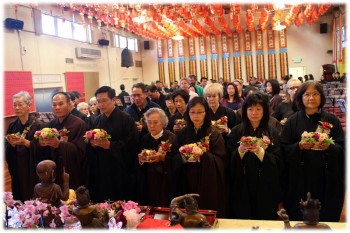
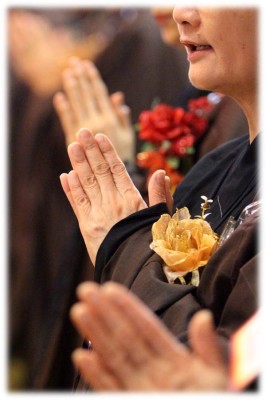 88 Buddhas Repentance Ceremony
88 Buddhas Repentance Ceremony One Stick of Incense
One Stick of Incense